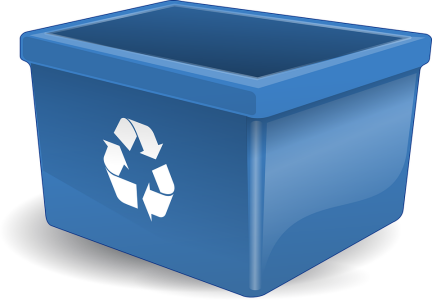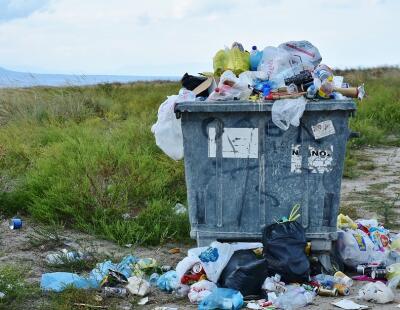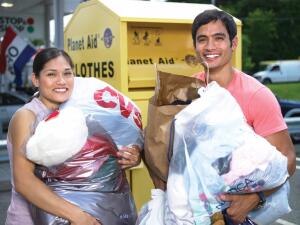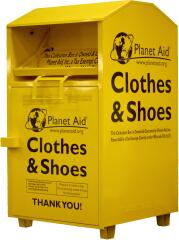What Can You Recycle in the Big Blue Bin?

Ah, the convenience of curbside recycling. You toss in bottles, cans, paper, plastic, and whatnot into one big bin and, voila, recycling happens!
If it were only that easy.
If you have read our previous blogs on this topic, you know that the advent of so-called "single-stream recycling" (a la the single blue bin) is hurting recoverable material volumes. The problem is all those darned "whatnots," like greasy pizza boxes, foam packing, plastic bags and other non-recyclables that are getting tossed into the bins, clogging separation machinery and swamping recovery facilities. The net effect is that usable stuff is becoming lost in a tidal wave of trash.
How Bad is It?
 The online journal Waste360 quoted one glass recycler saying that usable glass has dropped from 98 percent of glass volume (where it was ten years ago) to only 50 percent today because of trash contamination. In Wyoming, recycling workers in the city of Rawlins are so swamped in junk it now takes three times as much effort as it once did to extract the usable material.
The online journal Waste360 quoted one glass recycler saying that usable glass has dropped from 98 percent of glass volume (where it was ten years ago) to only 50 percent today because of trash contamination. In Wyoming, recycling workers in the city of Rawlins are so swamped in junk it now takes three times as much effort as it once did to extract the usable material.
Some municipalities are already taking action to correct the problem. For example, the City of San Antonio has enforced a fee for residents who throw used diapers into their blue bins. The Solid Waste Department of San Antonio reports that in the last six months the amount of soiled diapers that have ended up in the recycling bins has doubled. Currently, the fee stands at $50 for repeat offenders and is expected to increase.
This type of behavior is an unfortunate scenario, as diapers are extreme health and safety hazards, resulting in the contamination of the entire bin of recyclables.
Textiles Only, Please
At Planet Aid, we have first-hand experience in dealing with the problem of contamination. We often receive items other than clothing, shoes, or other household textiles in our yellow "textiles only" bins. We spend a lot of time removing the other stuff. Sometimes we can find someone who wants these other items. In Maryland, for example, we have partnered with the Maryland Book Bank to recycle books that were placed in our bins.
We would like to save more of the stuff we get, but unfortunately, we simply aren't equipped to do so. We wish everyone understood that putting non-recyclables into a recycling bin is not only costly but bad for the environment.
More education is needed to help consumers recycle effectively. It's important to always check with your local public works department to find out what recyclables they accept (here is an example from the Baltimore Public Works Department). And use online resources, like this electronics recycling guide, to help recycle those items that can't go into the big blue bin.
And remember, when it comes to textiles, do not place them in your curbside bin. With a very few exceptions, cities do not recycle textiles using curbside bins. Save your textile items for your nearby Planet Aid bin.

